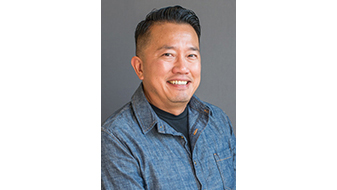After numerous incidents of racist and anti-Semitic graffiti on campus this year, conversations on race issues in the Iowa City and University of Iowa communities have become elevated. For professors on campus such as William Ming Liu, these conversations are vital to both their research and their roles as instructors.
“Professor Liu’s work is important and timely,” said Timothy Ansley, the head of the UI Psychological and Quantitative Foundations Department. “He is a scholar of the highest caliber, and his work in the areas of racism, classism, and social justice is not only advancing theory and practice in his field, it is also opening doors to crucial conversations.”
Liu, the program coordinator for the Counseling Psychology Department as well as a professor of psychological and quantitative foundations, focuses on such research topics as racism and gender and class issues. Liu said he believes that racism is about controlling white spaces and maintaining economic inequality rather than inherent bias, which is prominent in his work.
“My area of research addresses the limitations of traditional and dominant approaches to research and clinical practice,” Liu said. “For instance, my focus on racism and white supremacy shows that these ideologies and practices are explicit in the ways in which we conceptualize clients and design research and very subtle in the ways white people interact with people of color. My research is an attempt to make these aspects of racism and white supremacy explicit, to frame it within research theories and scholarship, and to find new ways to conduct research and counseling.”
Liu became interested in topics addressing racism, social class, and classism because of his experience growing up in a poor Asian-American family.
“In my master’s program and doctoral program, my advisers encouraged me to pursue these areas of scholarship, even when at that time, multiculturalism was seen as non-legitimate area of research by many white researchers in psychology,” Liu said. “Of course for me, the more people resisted these areas, the more it motivated me to pursue it and advocate for it in psychology.”
Along with his studies, Liu has contributed to a number of publications and journals. He is working on the book Psychology of Privilege, White Supremacy, and Power, along with research articles that address similar topics. Liu will explore the ways in which people of color respond to racism and how they exist in racist environments.
He is the editor-in-chief of the journal Psychology of Men and Masculinity, part of the American Psychological Association.
After receiving a grant from the Veterans Rural Health Resource Center in 2011, he helped develop funding opportunities for the Iowa City Lodge Project in collaboration with the Veterans Affairs Medical Center. The venture was inspired by his counseling and research work with the Shelter House after serving on its board of directors from 2014 to 2015.
“The Lodge occurred several years after I did counseling and research work with the Shelter and believed a permanent housing program with sustained employment and psychiatric support was a critical in recovery and developing psychological resilience,” Liu said.In the current political climate, Liu said, it is important to remain educated on issues that are detrimental to the community. Because racism and white supremacy are constantly changing, he said, it is important that people are up-to-date on the language, research, and culture that sustain the ideas.



